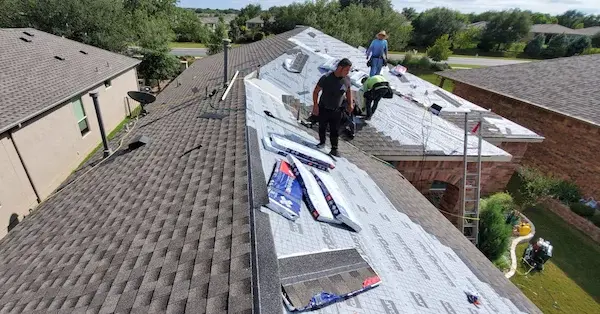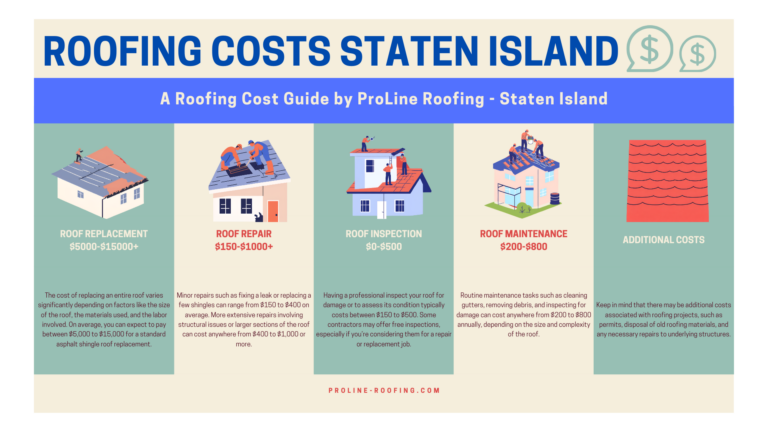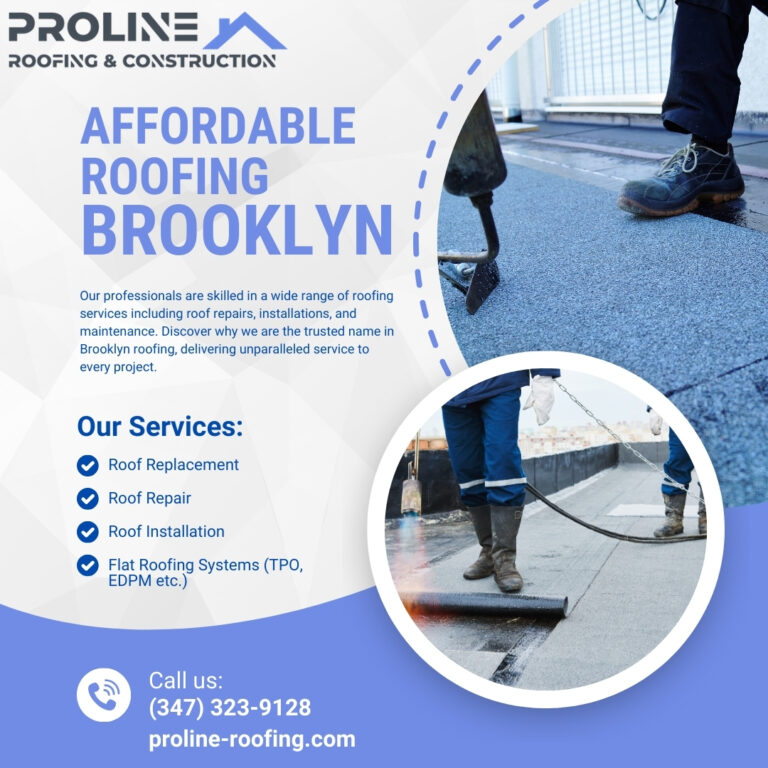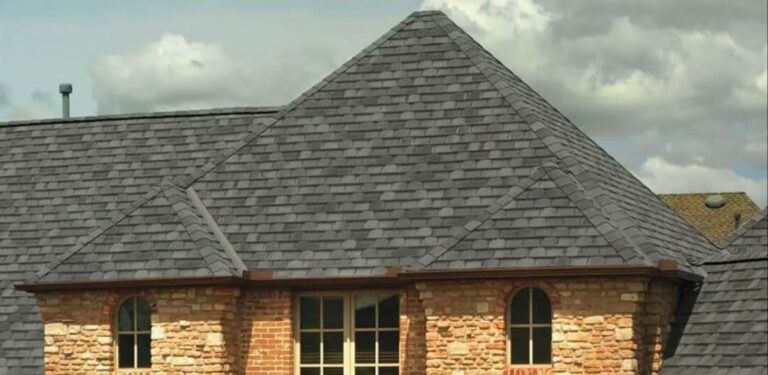As a homeowner in the bustling New York City and New Jersey metropolitan area, the decision to replace or upgrade your roofing system is a critical one that can significantly impact the appearance, energy efficiency, and overall value of your property. With a wide range of roofing options available, from traditional asphalt shingles to innovative solar-integrated systems, the selection process can be overwhelming.
To help guide you through this important decision, we’ve turned to the expertise of one of our roofers from ProLine Roofing, a seasoned professional with years of experience serving the unique roofing needs of homes and businesses in the region. In the following sections, we’ll explore the key roofing types you should consider, delving into their features, advantages, and suitability for the local climate and building codes.
As an experienced roofing contractor serving the New York City and New Jersey region, ProLine Roofing has a deep understanding of the various roofing options available and their suitability for the local climate and building requirements.
1. Asphalt Shingles
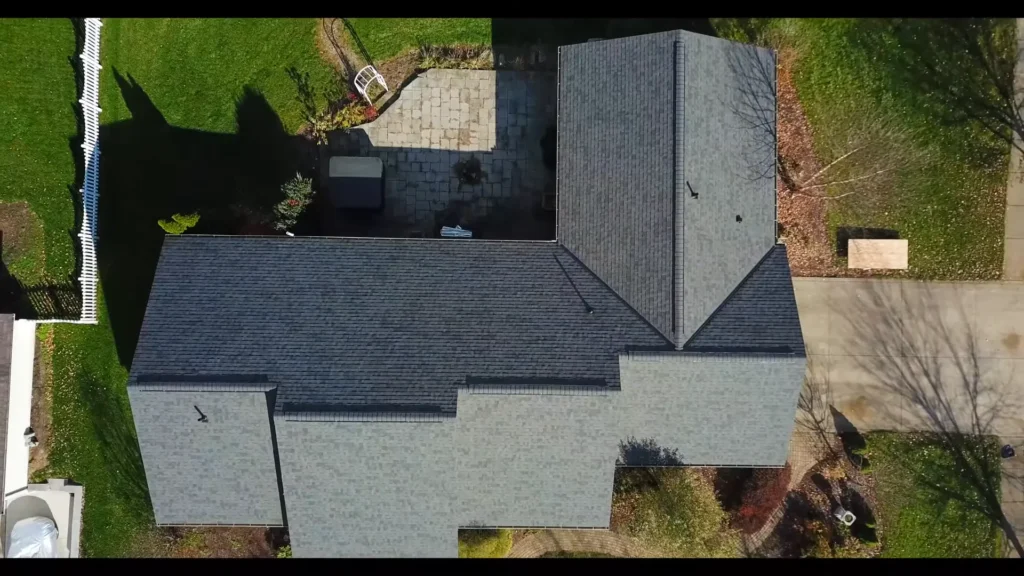
As our roofer explains, asphalt shingles remain one of the most popular and affordable roofing choices for homeowners in the New York City and New Jersey area. “Asphalt shingles are a tried-and-true option that offer a great balance of durability, aesthetics, and cost-effectiveness,” he says.
These shingles come in a variety of styles, from the classic 3-tab design to the more dimensional architectural and luxury options. “The 3-tab shingles provide a straightforward, traditional look, while the architectural and luxury varieties offer a more refined, textured appearance that can enhance the curb appeal of your home,” the roofer notes.
In terms of performance, asphalt shingles are known for their resilience to the region’s variable weather conditions, including heavy rainfall, snowfall, and high winds. “With proper installation and periodic maintenance, such as clearing debris from gutters and inspecting for any loose or damaged shingles, asphalt roofs can typically last between 20 to 30 years,” the contractor explains.
One of the key advantages of asphalt shingles is their affordability, making them a popular choice for homeowners on a budget. “Asphalt remains one of the most cost-effective roofing materials available, without compromising on quality and durability,” the roofer adds.
2. Metal Roofing
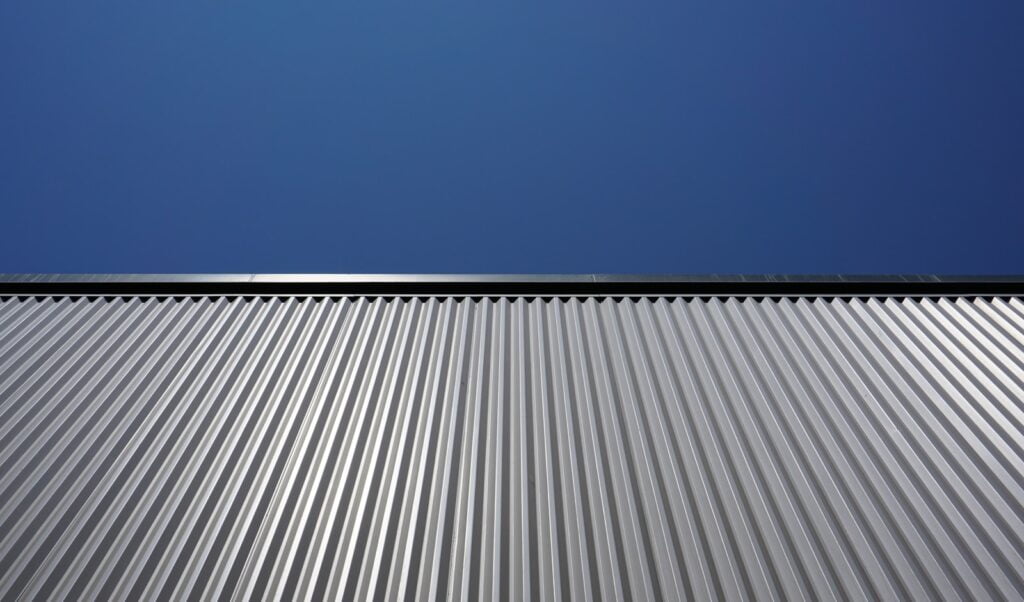
Shifting focus to metal roofing, our roofer highlights the numerous benefits of this innovative material. “Metal roofing is an increasingly popular choice, particularly for homeowners seeking a long-lasting, energy-efficient, and fire-resistant roofing solution,” he says.
The contractor explains that metal roofing comes in a variety of materials, including steel, aluminum, and copper, each with its own unique characteristics and performance factors. “Steel is a common and cost-effective option, while aluminum offers superior corrosion resistance, and copper provides a classic, elegant appearance,” he notes.
One of the key advantages of metal roofing, according to the contractor, is its exceptional durability and longevity. “Metal roofs can easily last 40 to 70 years, far surpassing the lifespan of traditional asphalt shingles,” he explains. “They are also highly resistant to fire, extreme weather conditions, and even impact damage from hail or falling debris.”
In addition to their long-lasting performance, metal roofs are also known for their energy-efficiency. “Metal roofs can help to reflect solar heat, reducing the amount of energy needed for cooling your home, especially during the hot summer months in the New York and New Jersey region,” the contractor says.
When it comes to the installation of metal roofing on NYC and NJ homes, the contractor emphasizes the importance of working with experienced professionals. “The specific installation requirements for metal roofing can vary depending on the local building codes and the unique features of the home, so it’s crucial to partner with a reputable roofing contractor who understands these nuances,” he adds.
3. Tile Roofing
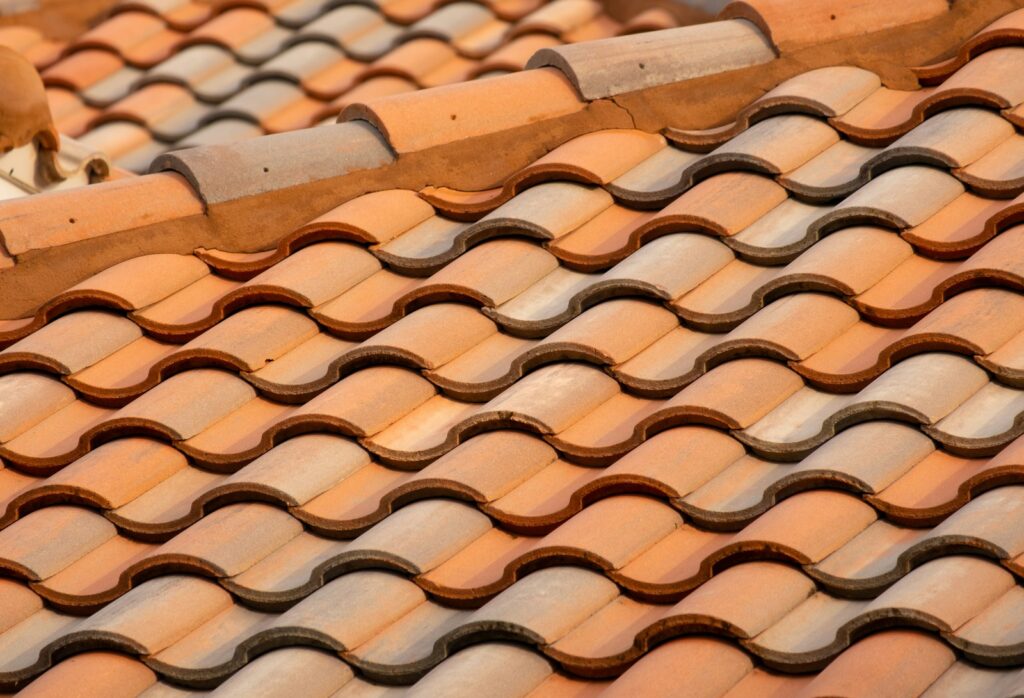
For homeowners seeking a more traditional, elegant roofing solution, our roofer highlights tile as an excellent option. “Tile roofing, particularly clay and concrete varieties, has a long and storied history in the architectural landscape of the Northeast, providing a timeless Mediterranean-inspired aesthetic that can enhance the curb appeal of any home,” he explains.
The contractor notes that tile roofing systems are renowned for their durability and longevity, often lasting 50 to 100 years or more with proper maintenance. “Tile is an exceptionally robust material that can withstand the harsh weather conditions common in the New York City and New Jersey area, including heavy snowfall, high winds, and intense rainfall,” he says.
In addition to their impressive durability, tile roofs also offer excellent insulation properties, which can contribute to improved energy efficiency and lower heating and cooling costs. “The natural thermal mass of tile helps to regulate indoor temperatures, making it a popular choice for homeowners looking to reduce their environmental impact and utility bills,” the contractor explains.
However, the contractor cautions that the installation of tile roofing can be more complex than other roofing systems, often requiring specialized expertise and equipment. “Tile roofs require a sturdy, properly designed roof structure to support their weight, as well as careful attention to details like flashing and ventilation to ensure long-term performance,” he notes.
4. Flat/Low-Slope Roofing
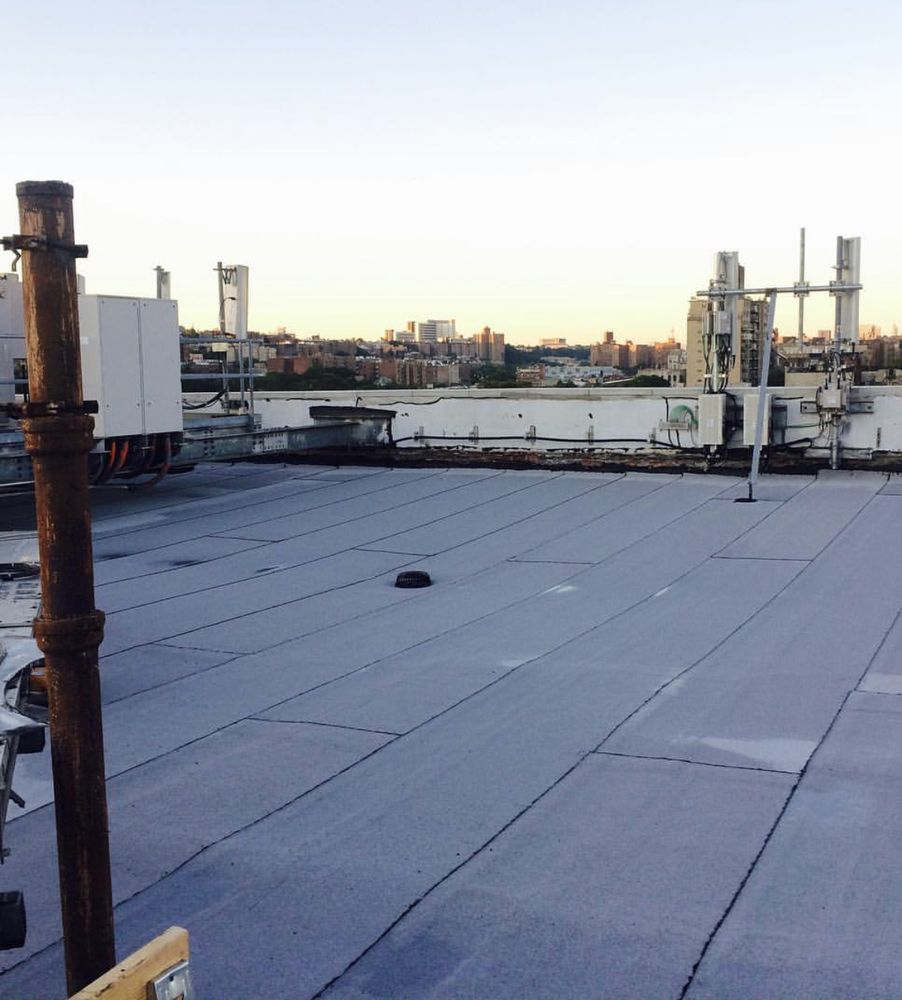
For homes and buildings with flat or low-slope roofs, our roofer explains that the selection of the right roofing system is crucial. “Flat and low-slope roofing are quite common in urban areas like New York City, where space is at a premium and the emphasis is on maximizing usable square footage,” he says.
The contractor highlights the various membrane options available for flat and low-slope roofing, including thermoplastic polyolefin (TPO), ethylene propylene diene monomer (EPDM), and polyvinyl chloride (PVC). “Each of these membrane types offers unique advantages in terms of durability, weatherproofing, and energy efficiency,” he notes.
According to the contractor, proper installation and ongoing maintenance are critical for the long-term performance of flat and low-slope roofing systems. “These types of roofs require meticulous attention to details like proper drainage, sealing of penetrations, and regular inspections to address any issues before they escalate,” he explains.
Failure to address maintenance needs on flat or low-slope roofs can lead to costly and disruptive leaks, the contractor warns. “Homeowners and building owners need to work with experienced roofing professionals who understand the nuances of these systems and can ensure they are installed and maintained to the highest standards,” he advises.
5. Solar Roofing
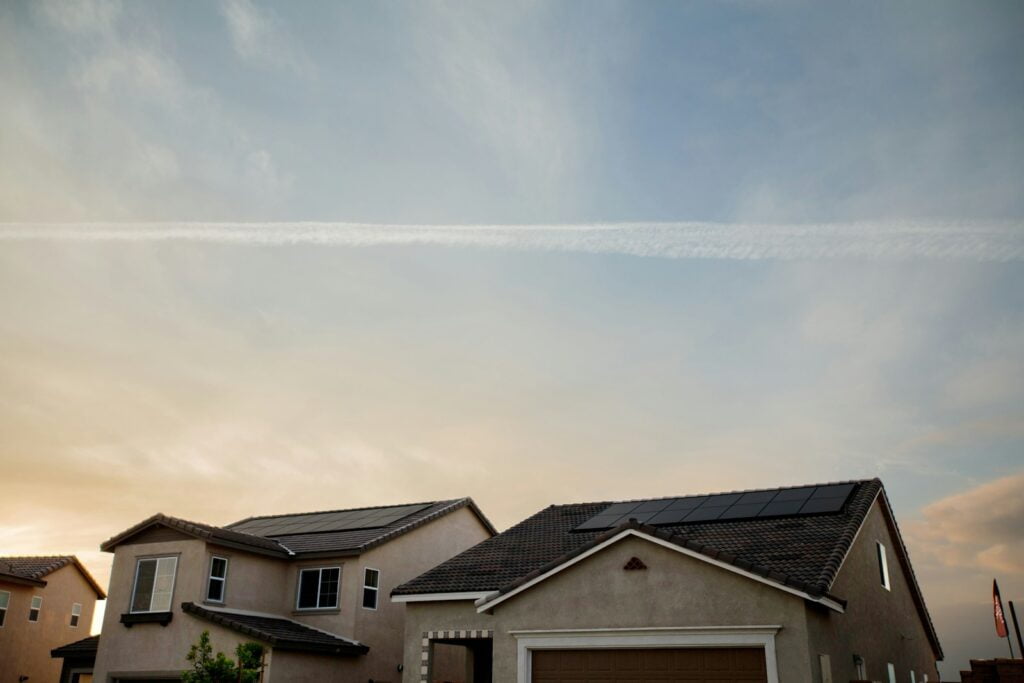
As the demand for eco-friendly and energy-efficient home solutions continues to grow, ProLine roofer notes that solar roofing is an increasingly popular option among homeowners in the New York City and New Jersey region.
“Solar roofing systems seamlessly integrate photovoltaic panels into the roof’s design, allowing homeowners to harness the power of the sun and generate their own renewable energy,” the contractor explains. “These integrated systems not only contribute to a more sustainable home but can also provide long-term financial savings through reduced utility bills and potential tax incentives.”
One of the key advantages of solar roofing, according to the contractor, is its ability to be paired with a variety of roofing materials, including asphalt shingles, metal, and even tile. “This versatility allows homeowners to choose a roofing system that complements the aesthetic of their home while also benefiting from the energy-generating capabilities of solar technology,” he says.
The contractor emphasizes the importance of working with a reputable roofing contractor who is experienced in the installation and integration of solar roofing systems. “Proper installation is crucial to ensure the maximum efficiency and long-term performance of these systems, as well as compliance with local building codes and safety regulations,” he notes.
In addition to the environmental and financial benefits, the contractor highlights the potential increase in property value that solar roofing can provide. “Homeowners who invest in solar roofing often see a significant return on their investment when it comes time to sell their property, as buyers increasingly value the advantages of renewable energy and energy-efficient features,” he explains.
Conclusion
As homeowners in the Staten Island and New Jersey metropolitan area navigate the wide range of roofing options available, the insights provided by our ProLine roofer offer a valuable guide to making an informed decision.
From the classic and affordable appeal of asphalt shingles to the long-lasting durability and energy efficiency of metal roofing, each roofing type has its own unique set of advantages and considerations. The roofer’s expertise also sheds light on the timeless elegance of tile roofing, as well as the specialized requirements of flat and low-slope roofing systems.
For homeowners seeking to embrace renewable energy and reduce their carbon footprint, the contractor’s perspective on the benefits of solar roofing highlights the growing demand for eco-friendly roofing solutions.
Ultimately, the choice of roofing material should be based on a careful evaluation of factors such as budget, aesthetic preferences, long-term performance, and the unique needs of the home or building. By consulting with a reputable local roofing contractor, homeowners can ensure they make the best decision for their property and their individual requirements.
Whether you’re in the market for a full roof replacement or simply exploring options for your next roofing project, this comprehensive overview of roofing types should serve as a valuable resource in your decision-making process.

